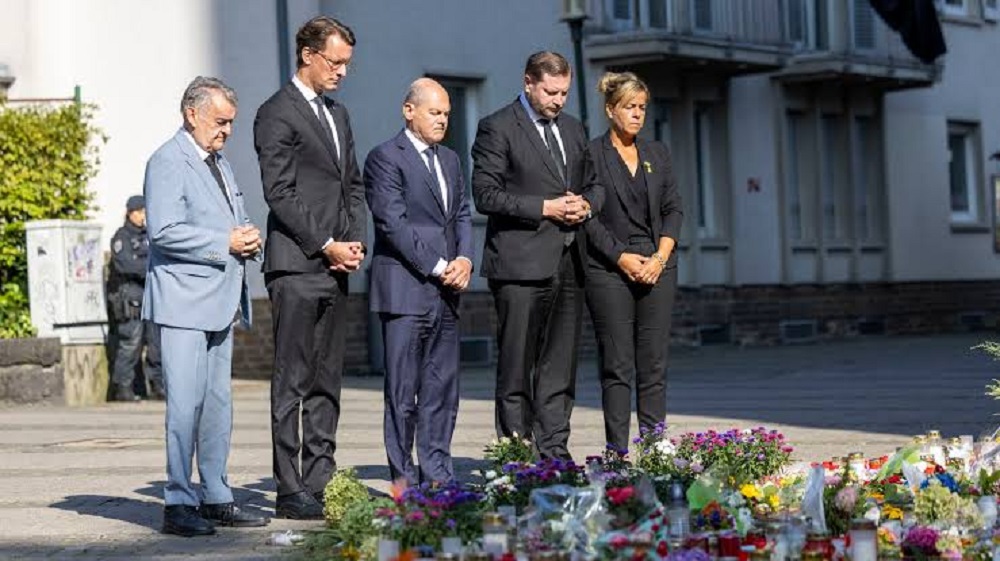Foreign
Germany To Toughen Deportation Of Rejected Asylum Seekers After Stabbing Case At Solingen

German Chancellor Olaf Scholz has vowed to toughen the deportations of rejected asylum seekers after it emerged the suspect in Friday’s knife attack was a Syrian who was due to be dismissed.
Mr Scholz made the remarks while visiting a makeshift memorial site for the victims of the attack in Solingen, which saw a suspected Islamic extremist stab three people to death and injure eight more.
The man, who turned himself in on Saturday night, was supposed to be deported to Bulgaria last year, as that was the first EU country in which he entered.
But according to German media reports, the deportation never happened because he disappeared for a period.
The attack sparked a fierce debate about immigration in Germany, which in May was still recorded as the EU country receiving the highest amount of asylum applications, according to the European Union Agency for Asylum.
In 2023, it received nearly a third of all applications lodged to EU countries, Norway and Switzerland.
The chancellor said he was “furious” about the attack on Friday night, which happened as the western city celebrated its 650th anniversary.
He said of the attack: “We must do everything to ensure that such things never happen in our country, if possible.”
Mr Scholz said that would include toughening knife laws in particular “and this should and will happen very quickly”.
Interior minister Nancy Faeser earlier this month proposed allowing only knives with a blade measuring up to 6cm (nearly 2.4in) to be carried in public, rather than the length of 12cm (4.7in) that is allowed now.
“We will have to do everything so that those who aren’t allowed to stay in Germany are sent back and deported,” he said, adding that “we have massively expanded the possibilities to carry out such deportations”.
Mr Scholz said there had been a 30% increase in deportations this year already, but “we will look very closely at how we can contribute to raising these figures even further”.
The chancellor had in June already vowed to resume deportations of criminals from war-torn Syria and Afghanistan after a stabbing attack by an Afghan immigrant in Mannheim in May left one police officer dead and four other people injured.
Foreign
Trump offers Elon Musk continued role in administration

President Donald Trump on Wednesday, at the White House, offered to extend Elon Musk’s advisory role within his administration.
The 53-year-old tech billionaire attended the first Cabinet meeting since President Trump marked his first 100 days in office.
In what resembled a farewell message, Musk said the American people “voted for secure borders, safe cities, and sensible spending, and that’s what they’ve gotten.”
Musk observed that “a tremendous amount” had been accomplished in the first 100 days—more, he claimed, than any previous administration.
He stated that this achievement “portends very well for what will happen for the rest of the administration,” and opined that it could be the “greatest administration” in America’s history.
Musk, a senior presidential adviser who heads the Department of Government Efficiency, confirmed that $160 billion had been saved since January.
The Tesla CEO, however, expressed concern about the attacks on his company, adding: “They do like to burn my cars, which is not great.”
In response, President Trump thanked Musk for his contributions, noting that he has “sacrificed a lot” and has also been “treated unfairly.”
Trump added that the vast majority of people respect and appreciate Musk for opening “a lot of eyes to what could be done.”
“We just want to thank you very much, and you are invited to stay as long as you want,” the President added.
Musk reportedly no longer operates from the West Wing, but his DOGE team continues to work from the Eisenhower Executive Office Building within the White House complex.
Foreign
Burkina Faso, Mali, Niger seek access to Atlantic through Morocco

Foreign ministers of military-ruled Sahel states of Burkina Faso, Mali and Niger said on Monday they endorse an initiative offering them access to global trade through Morocco’s Atlantic ports, Reuters reported.
The foreign ministers expressed their countries’ position during a meeting with Morocco’s King Mohammed VI in Rabat, it said.
The West African nations, run by military leaders who took power in coups in recent years, withdrew from the regional grouping ECOWAS last year and formed an alliance known as the Confederation of Sahel States (AES).
Morocco, a major investor in West Africa’s financial and agricultural sectors, announced its trade access initiative in November 2023, after ECOWAS imposed trade restrictions on the three states.
The initiative is conducive to “diversifying our access to the sea,” Mali’s foreign minister Abdoulaye Diop told state media.
The meeting “is part of the strong and longstanding relations of the Kingdom with the three brotherly countries of the Alliance of Sahel States,” Morocco’s news agency said.
The visit takes place as relations between the AES and Algeria, Morocco’s regional rival, deteriorate.
Algeria has cut ties with Morocco and backs the Polisario Front which seeks an independent state in Western Sahara, a territory Morocco considers its own and where it is building a port worth $1 billion.
The new AES grouping expelled French and other Western forces and turned towards Russia for military support.
In December, Morocco mediated the release of four French spies held in Burkina Faso, five months after Paris recognised Rabat’s sovereignty over Western Sahara.
Foreign
Massive power outage hits Spain, Portugal

A massive power outage paralyzed Spain and Portugal on Monday in an incident with no immediate explanation.
“It’s best to not speculate. We will know the causes soon. We are not discarding any hypothesis, but right now, we just focus on what’s most important: returning electricity to our homes,” Spanish Prime Minister Pedro Sánchez said at a news conference Monday.
The stoppage, which occurred about 12:30 p.m. Madrid time, caused chaos across the Iberian Peninsula and showed the vulnerability of Europe’s electrical grid — even on days without extreme weather or spiking demand.
Trains stopped running. Hospitals canceled surgeries, according to news agencies, and depended on backup generators. Business ground to a halt as machines were unable to process credit card transactions. The outage even suspended several Madrid Open tennis matches, with photos showing a court with nonfunctioning scoreboards and darkened stands. Sánchez urged citizens to restrict cellphone use and to call emergency dispatchers only “when it is really necessary.”
By about 5:30 p.m. Madrid time, Red Eléctrica, the corporation that operates Spain’s electricity grid, said some power had been restored across corners of the peninsula, including parts of Catalonia, the Basque Country and Andalusia. About two hours later, the utility provider said more than a fifth of the peninsula’s power had been recovered. Full recovery may take up to 10 hours, Red Eléctrica told Spanish news outlets, which means the country’s power could be restored some time late Monday.
“Causes are being analyzed, and all resources are being dedicated to addressing the issue,” Red Eléctrica said in a statement.
More than 50 million people live on the Iberian Peninsula, but authorities did not provide an immediate estimate for the number of people affected by the outage. Portugal’s national grid operator described it as a “massive cut” in electricity supply across the peninsula. Data from Red Eléctrica showed a sudden plunge in electricity demand from about 27,000 megawatts to less than 13,000. Levels remained abnormally low two hours later.
Spain’s Energy Ministry said in a statement that Sara Aagesen, a deputy prime minister, visited the Red Eléctrica control center to “learn about the situation firsthand and monitor the incident.”
“All necessary measures will be put in place to restore normality as quickly as possible,” the statement said.
Prime Minister Sánchez also held a meeting at the control center, with Aagesen and several other ministers present, the Spanish newspaper El País reported, and Spain’s National Security Council called a meeting to address the outage.
Portugal’s Lusa News Agency said the country’s cybersecurity center had seen no evidence so far that the blackout stemmed from a cyberattack. Separately, the Reuters news agency quoted unnamed officials as saying a cyberattack had not been ruled out.
The Spanish grid also connects with Morocco, France, Andorra and Portugal. Spain and France experienced a major blackout on July 24, 2021, but it lasted less than an hour.
Previous power outages in Europe have been caused by technical problems, lightning strikes and damaged cables. In 2003, Italy faced a huge blackout because a tree was too close to a power line, resulting in a flashover, or a jump of electricity from the line to vegetation.
-

 News16 hours ago
News16 hours agoA Chat with Janet Odio Okolo: A Mother’s Journey Raising a Child with Down Syndrome
-

 News22 hours ago
News22 hours agoAlleged money laundering: EFCC produces Aisha Achimugu in court
-

 News24 hours ago
News24 hours agoTinubu hails Dangote’s World Bank appointment
-

 News18 hours ago
News18 hours agoHon. Dennis Agbo Resigns From Labour Party
-

 News18 hours ago
News18 hours agoJust in: Osun PDP receives defectors from APC, others
-

 News22 hours ago
News22 hours agoCBN announces revised documentation requirements for PAPSS transactions
-

 News22 hours ago
News22 hours agoReps Set Stage for Nigeria’s First Legislative Conference on Renewable Energy
-

 News21 hours ago
News21 hours agoSpokesperson Warns Nigerians Against Fake Ministry Of Foreign Affairs Recruitment Scam






